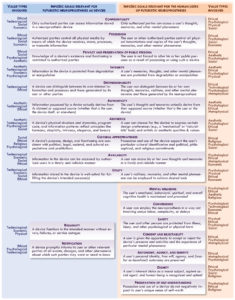Gladden, Matthew E. “An Axiology of Information Security for Futuristic Neuroprostheses: Upholding Human Values in the Context of Technological Posthumanization.” Frontiers in Neuroscience 11, 605 (2017). DOI: 10.3389/fnins.2017.00605 [MNiSW 2016 List A: 30 points; 2017 Impact Factor: 3.566]
 Abstract. Previous works exploring the challenges of ensuring information security for neuroprosthetic devices and their users have typically built on the traditional InfoSec concept of the “CIA Triad” of confidentiality, integrity, and availability. However, we argue that the CIA Triad provides an increasingly inadequate foundation for envisioning information security for neuroprostheses, insofar as it presumes that (1) any computational systems to be secured are merely instruments for expressing their human users’ agency, and (2) computing devices are conceptually and practically separable from their users. Drawing on contemporary philosophy of technology and philosophical and critical posthumanist analysis, we contend that futuristic neuroprostheses could conceivably violate these basic InfoSec presumptions, insofar as (1) they may alter or supplant their users’ biological agency rather than simply supporting it, and (2) they may structurally and functionally fuse with their users to create qualitatively novel “posthumanized” human-machine systems that cannot be secured as though they were conventional computing devices. Simultaneously, it is noted that many of the goals that have been proposed for future neuroprostheses by InfoSec researchers (e.g., relating to aesthetics, human dignity, authenticity, free will, and cultural sensitivity) fall outside the scope of InfoSec as it has historically been understood and touch on a wide range of ethical, aesthetic, physical, metaphysical, psychological, economic, and social values. We suggest that the field of axiology can provide useful frameworks for more effectively identifying, analyzing, and prioritizing such diverse types of values and goods that can (and should) be pursued through InfoSec practices for futuristic neuroprostheses.
Abstract. Previous works exploring the challenges of ensuring information security for neuroprosthetic devices and their users have typically built on the traditional InfoSec concept of the “CIA Triad” of confidentiality, integrity, and availability. However, we argue that the CIA Triad provides an increasingly inadequate foundation for envisioning information security for neuroprostheses, insofar as it presumes that (1) any computational systems to be secured are merely instruments for expressing their human users’ agency, and (2) computing devices are conceptually and practically separable from their users. Drawing on contemporary philosophy of technology and philosophical and critical posthumanist analysis, we contend that futuristic neuroprostheses could conceivably violate these basic InfoSec presumptions, insofar as (1) they may alter or supplant their users’ biological agency rather than simply supporting it, and (2) they may structurally and functionally fuse with their users to create qualitatively novel “posthumanized” human-machine systems that cannot be secured as though they were conventional computing devices. Simultaneously, it is noted that many of the goals that have been proposed for future neuroprostheses by InfoSec researchers (e.g., relating to aesthetics, human dignity, authenticity, free will, and cultural sensitivity) fall outside the scope of InfoSec as it has historically been understood and touch on a wide range of ethical, aesthetic, physical, metaphysical, psychological, economic, and social values. We suggest that the field of axiology can provide useful frameworks for more effectively identifying, analyzing, and prioritizing such diverse types of values and goods that can (and should) be pursued through InfoSec practices for futuristic neuroprostheses.
